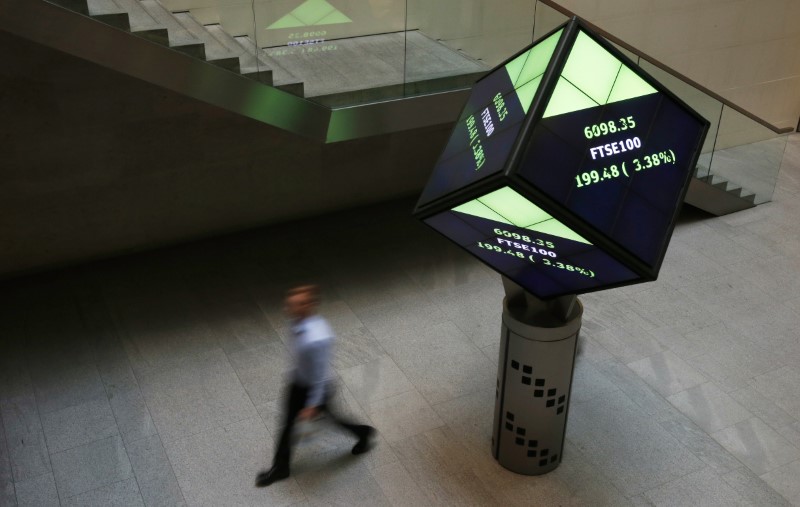By Marc Jones
LONDON (Reuters) - World shares hit their fourth all-time high in less than a month on Thursday and bond yields almost everywhere were lower, as investors bet that policy tightening in the United States would be glacial at best.
The overall mood was one of relief that U.S. Federal Reserve Chair Janet Yellen had not sounded more hawkish in her appearance before Congress the previous day, a green light for risk-taking.
Wall Street was expected to ring in another record peak for the Dow Jones Industrial Average when it resumes as the dollar pries itself off a nine-month low just in time for day two of Yellen's semi-annual Washington grilling.
The star performer overnight had been the Canadian dollar, which rocketed to 11-month highs after the country's central bank hiked interest rates for the first time in seven years and left the door wide open to further moves.
Sentiment got another boost when China reported upbeat data on exports and imports for June, the latest sign that global trade is finding some traction again.
It had helped push Asian shares up more than 1 percent and lift MSCI's 47-country world index to its latest record high, and though it took a while, Europe's main bourses eventually muscled higher too.
Traders there began hoovering up banks stocks again after a 1.6 percent gain on Wednesday had given the regional STOXX 600 its best day since April's French election victory for Emmanuel Macron.
"It mostly seems to be down to Yellen," Rabobank quantitative analyst Bas Van Geffen said. "The fact that it seems like the Fed is going to take it slowly is being seen as a good sign by the equity markets and by the currency markets."
One of the Fed chief's comments that markets latched on to was her view that the U.S. central bank would not need to raise rates "all that much further" to reach current low estimates of the "neutral" funds rate.
Equities were also underpinned by a drop in bond yields as Yellen sounded cautious on inflation. Debt markets jitters prompted last month by an outbreak of harmony among top central banks about tightening policy appear to have evaporated again.
Indeed, markets doubt even that modest Fed tightening will ensue and imply only a 50-50 chance of a interest rate rise by December <0#FF:>.
Treasuries rallied in reaction, with yields on two-year notes falling to three-week lows, as did bonds in Europe and Asia.
Germany's benchmark 10-year Bund yield was back below 0.5 percent, having now given back a quarter of the rise triggered by last month's hint from Mario Draghi that the European Central Bank was preparing to scale back stimulus.
Treasuries meanwhile have clawed back a third of their selloff.
"The market did perceive a greater degree of anxiety over inflation -- at the margin," said Westpac's U.S. economist, Elliot Clarke. "To our mind, this is unlikely to get in the way of another hike this year."
"Two further hikes in 2018 will likely be justified by conditions. However, the case for additional hikes thereafter is nowhere near being made."
OH CANADA
The odd one out was Canada, where yields hit their highest since late 2013 after the Bank of Canada raised rates a quarter point saying the economy no longer needed as much stimulus.
The Canadian dollar notched its biggest percentage gain since March 2016 and was last trading near one-year peaks at C$1.2726. [CAD/] The Aussie and Kiwi dollars jetted higher too.
The main loser was the U.S. dollar which slipped as far as 112.86 on the yen, while the euro went all the way up to $1.1480 before dropping back in European trading to $1.14.
Against a basket of currencies, the dollar was within a whisker of nine-month lows at 95.75 although it was clawing back some of its lost ground ahead of U.S. trading.
The drop in U.S. yields benefited gold, which pays no interest, and pushed the precious metal up 0.3 percent to $1,223.16 and away from its recent trough of $1,204.45.
Oil prices flatlined as producer club OPEC said it expected demand to decline next year as rivals pump more, though the Chinese trade data showed it remained a heavy buyer.
Brent crude futures were off 20 cents at $47.52 a barrel, while U.S. crude eased 17 cents to $45.31.
Asia's share market gains had also lifted Indian stocks to an all-time high. South Korea and Australia's main indexes both climbed 1.1 percent too, the former helped as its central bank kept interest rates at a record low.
Japan's Nikkei had been restrained by a firmer yen and ended flat, though emerging market stocks stood tall as they climbed to a new 26-month high on the Fed's soothing signals.
"Dollar positioning is short and yesterday's testimony just confirmed what the market believed: that the Fed is not going to be able to be as hawkish as they are suggesting," said Athanasios Vamvakidis, head of G10 FX strategy with Bank of America Merrill Lynch (NYSE:BAC) in London.
